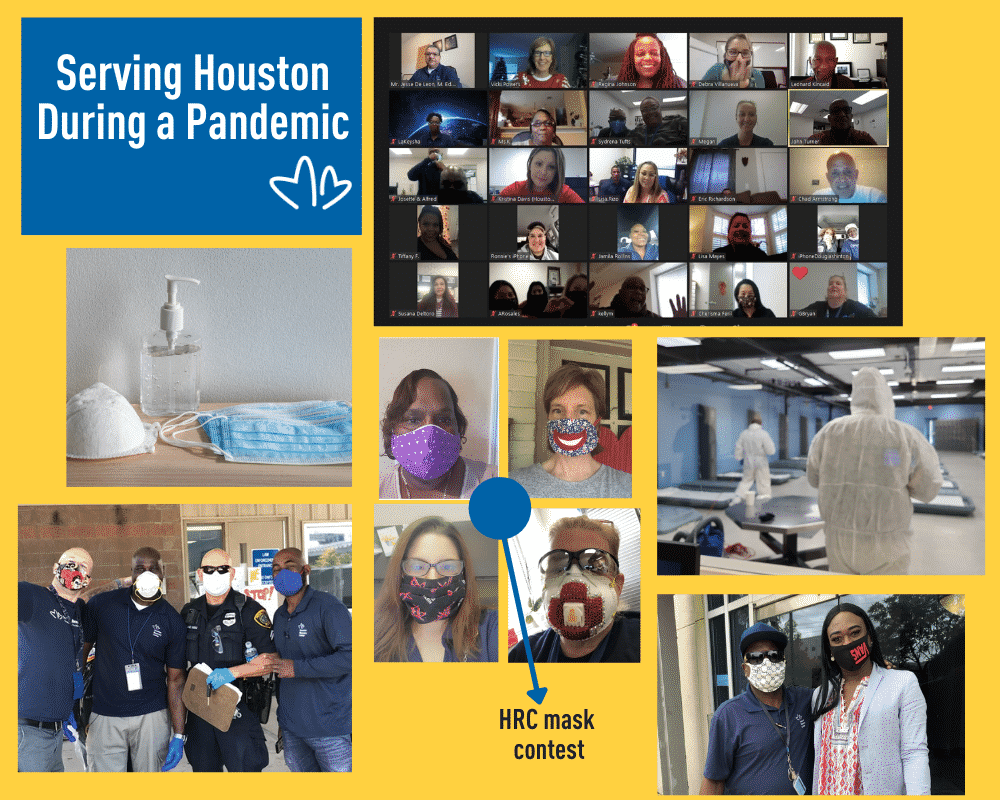One Year of Operations During COVID-19
By Vicki Powers
What a year. Do you remember how it all started in 2020?
March 11: Houston Rodeo closed weeks early
March 16: Harris County announced all restaurants and bars in Houston were closing the next day.
March 19: Texas closed restaurants, bars, and schools for two weeks. And it got extended…
At the time, there were 30 confirmed cases of COVID-19 in Harris County. A year later, that number sits at 367,000+.
A lot has changed in the past year. A lot. But Houston Recovery Center’s dedication to serve Houston during a pandemic stands as strong as ever.
Transitioning to New Norms
Cecelia Martinez, recovery support specialist supervisor, says COVID-19 required new procedures at the sobering center with medical intake and RSS staff. Entry into the sobering center drastically changed, she says. At first, individuals needed to pass a screening at the back door by the medical team, including temperature check. Then it got more difficult to get in, she says, because individuals needed a negative COVID-19 test within the last 72 hours.
“We are already a department that is consistently changing – and on top of that, COVID-19 hit,” Martinez says. “We had jail diversion clients who got turned away because they didn’t pass our screening. I know we lost an opportunity to help someone a few times because of it.”
These tough choices centered around keeping everyone safe – staff and clients, she relates. It’s definitely been a struggle, Martinez says, but they persevered through it all.
“The hardest part of serving during the pandemic is dealing with everyone’s fears, including my own,” Martinez says. “It requires finding ways to finesse how to make everyone feel safe.”
Working Virtually
Houston Recovery Center staff (outside of the sobering center) started working remotely when the city shut down. This transition required setting up a home office, as well as boundaries, to make it productive.
Lisa Rizo, recovery support specialist in Adult Probation, is grateful Houston Recovery Center enabled staff to work remotely and not lose their jobs. She says it was a little different to balance home life with working, but she woke up with a mindset like she was coming into the office.
“The most challenging part was staying connected with all the people we work with,” Rizo relates. “A lot of people we lost contact with, a lot of people went back into full addiction. We were just trying to keep them engaged, inspired, and hopeful.”
Sydrena Tufts, recovery support specialist in Harris County Courts, says the most challenging part of working virtually was keeping up with her participants. Some don’t have phones or laptops so there is no way of communicating, and they lose contact. She also wasn’t able to see clients while in treatment.
“Things you normally do, you can’t do,” Tufts relates. “It’s getting better, and I’m learning how to deal with uncertainty.”
Chad Armstrong, recovery support specialist to UTHealth’s HEROES program, notes the positive side to this new environment.
“Working virtually has definitely made it possible to reach more people seeking services,” Armstrong relates. “The most challenging has been not having the human connection with clients. I have worked with individuals for almost a year and not met them in person.”
Houston Recovery Center continues to provide a safe environment for clients and staff, while we navigate a new norm a year later.




